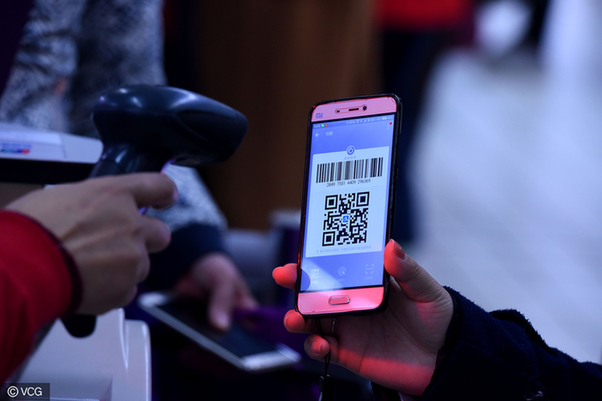Service of mobile devices dominates Alipay
- By Wu Jin
 0 Comment(s)
0 Comment(s) Print
Print E-mail China.org.cn, January 6, 2017
E-mail China.org.cn, January 6, 2017
|
|
|
A customer uses the Alipay app. [Photo/China.org.cn] |
Mobile phone based transactions continued to maintain strong momentum last year among the users of Alipay, the third-party online platform affiliated to Ant Financial, a branch of Jack Ma's Alibaba.
According to a report released by Alipay on Jan. 4, about 71 percent of the transactions among 450 million users registered with real names on Alipay last year were completed by cell phones. Users born in the 1980s and 1990s were the most prolific consumers with the average annual spend of a single person born in the 1980s surpassing 120,000 yuan (US$17,500) and 91 percent of post-1990s paid their bills simply by moving index fingers.
The dominant mobile payment system has expanded radically from big cities such as Beijing, Shanghai and Guangzhou, to the hinterlands including Tibet, Qinghai and Gansu provinces. Meanwhile, Tibet has secured a top position for five years in a row for the rate of Alipay's mobile device service which accounted for 90 percent of local online transactions last year.
With mobile telecommunication signals covering the entire region of Tibet, smart phones are in use in the far-flung villages and pastures which resulted in the increasing use of mobile payments.
However, despite the growth in the country, concerns over systematic credit services and environmental protection are growing fast, the report revealed.
Last year witnessed the surge of credit payments by 344 percent to a total of 3.2 billion bills transacted via Ant Check Later, an online credit service platform established by Alibaba. At the same time, loans issued by the lending platform (JieBei) of Alipay exceeded 300 billion yuan among 12 million users.
Moreover, users of Alipay's online service to facilitate the payments of gas, electricity, tap water and fines of traffic violations soared by 218 percent year on year to almost one billion people from 357 cities, 54 percent of the total.
To share the major public concerns over environmental protection, Alipay created an APP called Ant Forest in August 2016 in a bid to inform the users of the carbon emissions they have reduced by using online payments in their own accounts. Once a user's personal carbon emissions have reduced to a certain degree, the Ant Forest will partner with selected social organizations to plant a tree. So far 520,000 trees have been planted in line with the reduction of 1,000 tons of carbon emission each day on average.
Alipay also provides services for overseas travels that are especially popular among young people. Overseas tourism in China grew by 160 percent last year and the data collected by Alipay shows that the favorite destinations of Chinese travelers include South Korea, Singapore, Japan, New Zealand and Germany.
The report also found that unlike high net worth individuals, 81 percent of the nearly 100 million users of Ant Wealth, a fortune management platform of Alipay, favor financial services with low thresholds.
Additionally, online business transactions and financial services are narrowing the gap of urban and suburban residents as young people born in the 1980s and 1990s from the third-and-fourth-tier cities are enjoying equal services of the online financial platforms with their counterparts in big cities.







Go to Forum >>0 Comment(s)